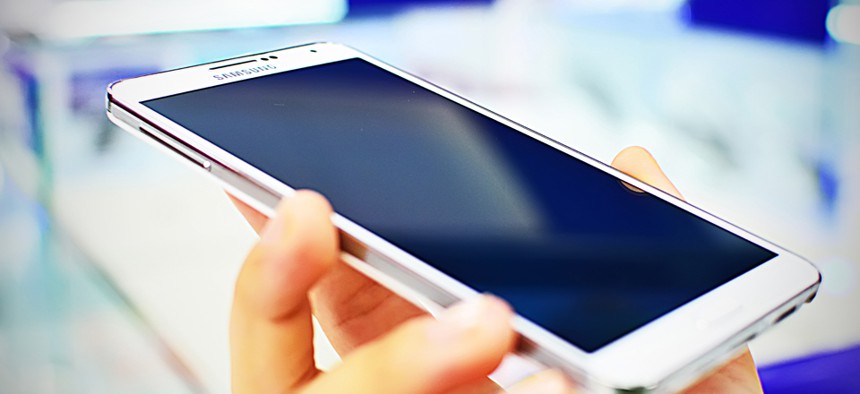Pentagon App Store Is Open, but the Shelves Are Pretty Bare

Tanjala Gica/Shutterstock.com
The Defense Information Systems Agency so far has approved only one software application designed specifically for troops—to report sexual assault.
The Defense Information Systems Agency’s new Mobile Applications Store is open for business, but don’t expect to shop there for military-grade killer software.
The store offers Slate, Pandora, TED and Twitter apps, along with apps for USAToday, Flipboard, Facebook and Kindle.
But of the 19 apps available in the store as of April 30, only one is a unique military application—DoD Safe Helpline. That’s a “crisis support” app for service members who are dealing with sexual assault. The app promises access to live, confidential help that is “anonymous, secure, and available worldwide, 24/7 by click, call or text.”
DISA opened the app store Jan. 31 as a means of delivering approved software applications to military-issued smartphones and tablet computers. Those devices are controlled by the agency’s new Mobile Device Management system, which enables the store to deliver apps, to update them and even delete them, DISA says.
The app store offers the ubiquitous Adobe Reader and Adobe Connect Mobile. The latter, Adobe says, enables smartphone and tablet computer users to confidentially “host, share, collaborate, and train from anywhere, anytime” by exchanging photos, documents and multimedia content from libraries in the cloud.
App store shoppers can get Documents to Go 3.0, which enables “work from anywhere: view, edit and create Microsoft Offices files and view Adobe PDF files” on Android smartphones and tablets.
And there are two Fixmo applications that provide “defense-grade security” and mobile device tamper detection. Meanwhile, two other apps make it possible to use common access card readers with mobile devices to sign in to military networks.
But there are no apps that would enable troops to call in airstrikes or fire support from their smartphones and tablets and no apps that tap the GPS capabilities in devices to help with land navigation in remote areas. There are no force tracker apps, and no apps that would allow troops to order video feeds from friendly UAVs flying overhead.
Such apps and others aimed at serving military personnel have been developed and tested by the Army, defense contractors and other organizations.
So far, there are only about 2,000 mobile devices in use under the DISA system, but the agency’s goal is to have up to 100,000 in use by October.
The dearth of military-oriented apps in the DISA store is indeed surprising, said Daniel Goure, a defense analyst at the Lexington Institute in Arlington, Va. “You give these mobile devices to 22 year old privates, and a day later they come up with cool apps.”
“You would assume [the app store would offer] a military version of Google Earth,” Goure said. That would enable smartphones and tablets to retrieve maps, satellite images, photos and descriptions of locations around the globe.
Apps that are able to “pull down intelligence data” from military networks are an obvious choice, he said. And logistics apps that track supplies—from bullets and beans to laser-guided bombs—would be useful, Goure said. Walmart can do it, why not the U.S. military?
How about an app that lets smartphones and tablets monitor friendly and enemy forces in a particular city block or in a village? Or an app that provides intelligence about the location of roadside bombs along key transportation routes during the last 36 hours? Goure asked.
John Hickey, the Defense Information Systems Agency program director who oversees the mobile device management system and the app store, says more apps are on the way. “We’re looking at how we can leverage what the services have already done and make it available to everyone,” he said during a May 5 conference hosted by C4ISR & Networks.
But it’s not a swift process. First DISA must carefully vet each app to make sure it meets stringent security requirements, Hickey said. And there are other hurdles. For example, new Apple devices come with free office apps, but older ones didn’t. Will DISA have to buy the office apps for older Apple devices? Hickey asked.
Office apps are free for Android devices, he said. But “how do you get approval for Docs to Go to sit inside the Knox container,” the central security feature for Samsung mobile devices. “Do you do that through Samsung or do you have to go to the app owner? A lot of that is new. Those are things we’re working through, and that’s why initially you won’t see a ton of apps” in the app store, he said.
(Image via Tanjala Gica / Shutterstock.com)





